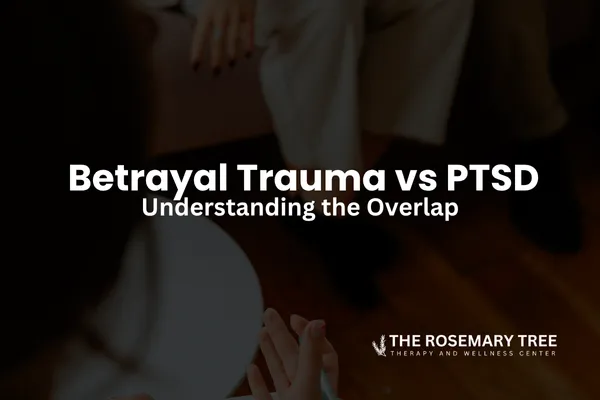
Betrayal Trauma vs. PTSD — Understanding the Overlap
Betrayal Trauma vs. PTSD - Understanding the Overlap
Is Betrayal Trauma the Same as PTSD?
When betrayal happens, through infidelity, lies, or emotional abandonment, the pain can feel like your entire world has shifted. Many people describe it as “losing the ground beneath them.” You might replay conversations, question what was real, or struggle to feel safe again, even around people you trust.
For many, betrayal trauma feels just like post-traumatic stress disorder, or PTSD. While betrayal trauma is not a formal diagnosis, it creates a similar emotional and physical response in the body. Both experiences involve a deep rupture in safety, trust, and control.
Your brain and nervous system react to betrayal as if you were in danger, activating the same protective systems that respond to trauma.
How Betrayal Trauma and PTSD Are Connected
PTSD is most often linked to events that threaten physical safety. Betrayal trauma threatens your emotional safety—your sense of belonging, attachment, and identity.
In both, your nervous system is thrown into survival mode. You might notice:
Intrusive memories or flashbacks
Panic or emotional swings that feel out of control
Trouble sleeping or concentrating
Avoiding reminders of what happened
Physical tension, headaches, or fatigue
Feeling numb, detached, or emotionally flat
These are not signs of weakness. They are signs that your body is trying to protect you.
Why Betrayal Feels So Traumatic
When you discover betrayal, the brain’s fear center, called the amygdala, activates as if your life were at risk. Your body floods with stress hormones like cortisol and adrenaline. Even though the threat is emotional, your body does not know the difference.
Over time, this stress response can become “stuck on.” Your body stays alert, ready for danger that is no longer there. This is why even small reminders, your partner’s phone lighting up, a familiar scent, or a random song, can bring back waves of panic or sadness.
Understanding this helps you see that your reactions are not overreactions. They are trauma responses that need care and safety to resolve.
The Four Trauma Responses
After betrayal, most people notice one or more of these survival patterns:
Fight: Feeling angry, defensive, or ready to confront.
Flight: Keeping busy, avoiding stillness, or emotionally withdrawing.
Freeze: Feeling numb or paralyzed, unable to decide what to do.
Fawn: Over-accommodating or trying to fix everything to keep peace.
These patterns are your nervous system’s attempt to survive emotional chaos. Healing starts when you begin to notice them and understand that they are protective, not permanent.
Why Weekly Therapy Can Fall Short
For some couples, traditional therapy helps create awareness. But for those facing betrayal trauma, an hour a week often isn’t enough. Just as you start to open up, time runs out. The emotions build, but there’s no space to process them.
Healing trauma requires depth, time, and containment—all of which are difficult to achieve in short sessions.
That is why many couples and individuals turn to Accelerated Deep-Work Therapy Intensives.
How Therapy Intensives Help
During an intensive, you spend multiple hours each day with one or more licensed clinicians who specialize in trauma and relationship repair. These extended sessions allow you to:
Understand how betrayal has impacted your nervous system and emotions
Safely process memories and triggers without being rushed
Learn tools for emotional regulation and grounding
Rebuild a sense of safety in your body and in your relationship
Clarify what you need to heal and move forward
Therapy intensives provide the safety and time needed for your brain to begin rewiring how it processes threat and trust.
Healing the Body as Well as the Mind
You cannot think your way out of trauma. The body must also feel safe again. That is why intensives often include mindfulness, breathing exercises, and grounding practices to help calm your nervous system.
When your body begins to relax, your mind follows. Slowly, you stop reacting from panic and start responding from clarity. This is when real healing begins.
What Healing Can Look Like
Recovery from betrayal trauma is not about forgetting what happened. It is about remembering without reliving it. It means having space to breathe again, to trust again, and to feel like yourself again.
You may notice progress through small but powerful shifts:
Sleeping through the night without intrusive thoughts
Feeling calm when you talk about the past
Noticing compassion where there used to be only pain
Reconnecting with your partner or loved ones without fear
Feeling grounded in who you are again
Healing is not about perfection. It is about peace.
Moving Forward
Betrayal trauma can feel isolating, but you do not have to walk through it alone. With the right guidance and time, it is possible to feel safe, connected, and hopeful again.
At Rosemary Tree, our therapy intensives are designed to meet you exactly where you are, helping you go deep into the healing work with care and support every step of the way.
Final Thoughts
You are not broken. You are having a human response to deep emotional pain, and there is a path forward.
If you know you need this, click here to submit an inquiry and we will get back to you right away to get the process started for you. This is an in-person service, but you can still reach out and have a conversation with us. We can talk with you and help you explore whether this next step feels right for you.


